Grant Spotlight | May 31, 2018
Share ThisMay 31, 2018
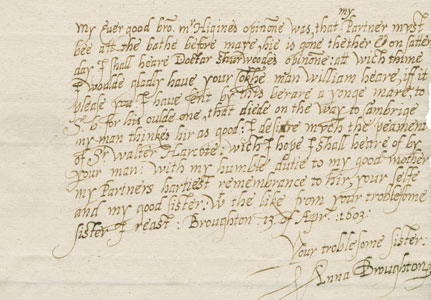
“We learned through this project how to balance the intense desire to digitize all of our assets with the interpretive activities that our visitors want.” Eric Johnson – Director of Digital Access, Folger Shakespeare Library
The Folger Shakespeare Library’s location in our nation’s capital makes it clear that Shakespeare belongs to “you.” As the keeper of the world’s largest Shakespeare collection, the library embraces all who wish to learn about the Bard of Avon and revel in the exploration of William Shakespeare and his world.
The library is also recognized as the leading U.S. institution engaged in teaching paleography, the somewhat lost art of deciphering English Secretary Handwriting. The expertise served the library well when they embarked on a three-year project to “unlock” Early Modern English manuscripts and grow the community of people trained in paleography.
Unlocking the Past
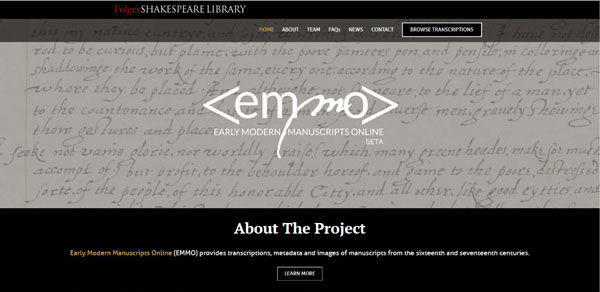
Folger’s IMLS grant project, Early Modern Manuscripts Online, known as EMMO, provides scholars and the general public with convenient access to transcriptions, images, and metadata for manuscripts from the Early Modern Era (16th to 17th centuries). “Unlocking” these manuscripts became of special interest to the library as these documents—which consist of personal items such as diaries, letters, wills, and account books—are mostly written in English Secretary Hand, a challenging style of handwriting that many scholars today are not trained to read. As a result, the lack of transcription of many of these documents has resulted in a gap of understanding about English society during the 16th and 17th centuries. EMMO changes that by deciphering the texts of thousands of manuscripts, making available a new cache of primary source material.
“We initiated this project because we knew how difficult it was for researchers to access our manuscripts because of the handwriting barrier,” said Heather Wolfe, Principal Investigator, Curator of Manuscripts at Folger Shakespeare Library. “With EMMO, we wanted to create access that could break down those barriers and make texts written in English Secretarial Hand readily available.”
Democratizing Transcriptions
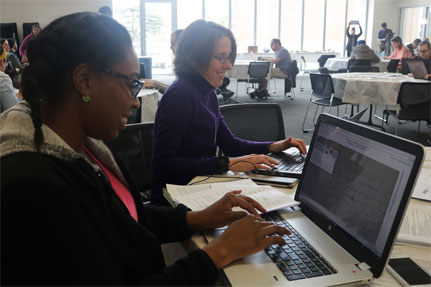
Dromio, EMMO’s transcription software, was built with teachers and researchers in mind. Available for download on emmo.folger.edu, students, scholars, and the curious general public can transcribe these hard-to-read manuscripts. Dromio is also deployed in college classrooms across the United States, where professors incorporate the tool into class assignments and exercises, introducing students to the experience of “slow reading” and the challenges of interpreting primary sources. Folger used Dromio in nine intensive introductory and advanced paleography classes during their IMLS grant period.
Since many transcriptions in EMMO are crowdsourced, a significant feature of Dromio is the ability to collate multiple versions of text and mark up them, highlighting differences and suggesting consensus among text and semantic tagging.
“Dromio and EMMO have allowed us to do a couple of different things,” said Mike Poston, the Folger Shakespeare Library’s encoding architect who built Dromio. “It has helped us build a community, and that community continues through this tool. And in some ways, that community continues to be an advocate for paleography.”
Today, Dromio has more than 1,900 unique users who have collectively transcribed or vetted nearly 22,000 images.
Crowdsourcing Transcriptions
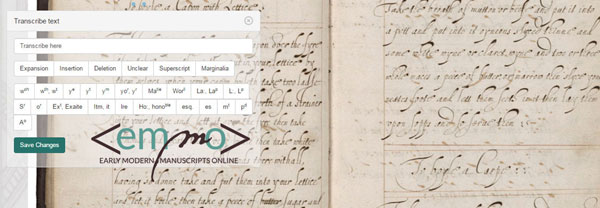
Among the library’s partners for EMMO is Zooniverse, who worked with the library to design a robust and state-of-the-art crowdsourcing transcription platform, “Shakespeare’s World.” The platform engages with the public who transcribe and tag manuscripts. When three or more transcriptions reach a high level of consensus, the manuscripts are officially retired from the platform.
Shakespeare’s World is more than just a transcription tool—it’s a community builder. Users can converse with one another, write and edit blog posts, and encourage learning and public engagement. Shakespeare’s World has logged over 124,000 sessions with nearly 400,000 page views, and has a steady community of 50-120 daily active users.
“Through these partnerships, we learned the critical role that crowdsourcing plays in building and engaging a community of learners and creating content that everyone can use,” said Wolfe.
Transcribathons
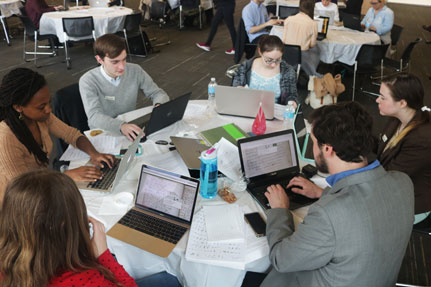
One of the project’s goals was to broaden the very narrow paleography community, encouraging undergraduate students to embrace primary sources and learn how to read and steward them. Through partnerships with different learning institutions like the University of Connecticut, University of Michigan, University of Pennsylvania, Wellesley College, and the University of South Carolina, the library hosted “transcribathons,” or the transcription of manuscripts in a group setting. First coined by the library, “transcribathon” is now a widely-adopted term in the community.
In three years, the library conducted 16 transcribathons that involved over 1,000 participants. Success of the transcribathon model encouraged undergraduate students to engage with primary sources while also contributing to the broader field and witnessing research in action.
“It’s been incredible to see how delighted and empowered these students feel when they realize they, too, can decode these documents,” said Wolfe.
Democratizing Transcriptions
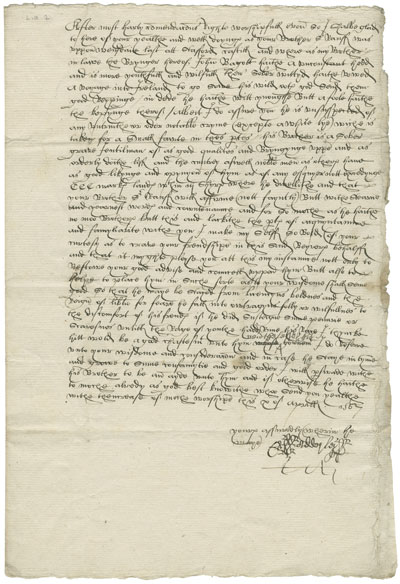
EMMO and Shakespeare’s World ultimately accomplished what they set out to do three years ago: strengthen a community of paleographers across the country. Through EMMO, the library transcribed more than 15,000 digitized images—about 30 percent of its current dataset. Of these transcriptions, 337 images representing 100 manuscripts are published and viewable online. Roughly 2,100 transcriptions have been vetted for accuracy and are awaiting final markup prior to final publication.
Lexicographers, too, have been benefited from EMMO and its success. Shakespeare’s World contributors have reported numerous usages of words that significantly antedate usages currently listed in the Oxford English Dictionary (another project partner). Discoveries of early usages of “white lie” and “partner” in Folger manuscripts by Shakespeare’s World volunteers prove that EMMO has significant implications for the evolution and understanding of the English language.
Most importantly, however, the library inspired a waning community of paleographers to find themselves again by crowdsourcing transcriptions. The library has expanded its capacity for delivering transcriptions, and broadened access to the field of paleography. What was previously an elite field is now a community where individuals and amateur paleographers can come together, puzzle over difficult manuscripts, exchange ideas and share best practices.
“Through EMMO, we were able to create and incorporate a tool that makes it easy for anyone to transcribe primary source documents,” said Eric Johnson, Director of Digital Access at the Folger Shakespeare Library. “It fits more broadly into our goal of inclusivity at the library, and to bring otherwise hidden and obscure material into the limelight.”
Transcriptions for the Future
For the library, the launch and success of EMMO and Shakespeare’s World are only the beginning. Eventually, the library will include transcriptions and images from other institutions, expanding EMMO into an online transcription hub for cross-institutional manuscripts that help the public understand the past and their place in the English language.
But, more broadly, the library must reconcile what crowdsourcing transcriptions does to the business of accurate reading and interpretation of history.
“Our visitors at the library are seeking knowledge and understanding,” said Johnson. “Through EMMO, we are not only helping them read and understand history, but teaching them how to unlock materials on their own.”
About the Project
Grant Project Name: Folger Shakespeare Library, Early Modern Manuscripts Online
Grant Log Number: LG-05-13-0353
Year Awarded: 2013
Recipient: Folger Shakespeare Library, Amherst College
Project Contact:
Eric Johnson, Director of Digital Access
ejohnson@folger.edu
202-675-0345
Website: www.emmo.folger.edu
Wellesley College Transcription Video: https://bit.ly/2IORbUQ
